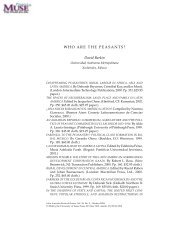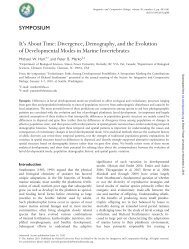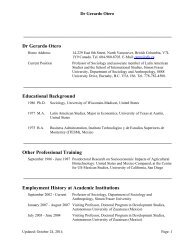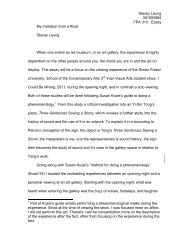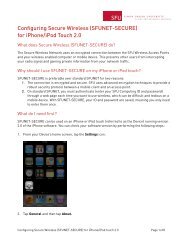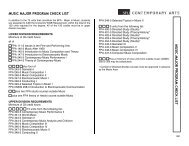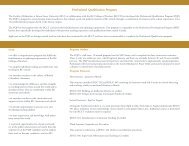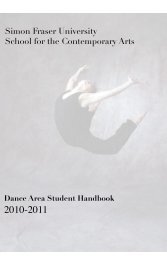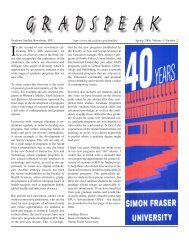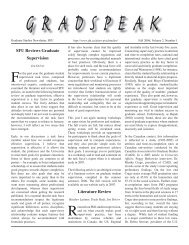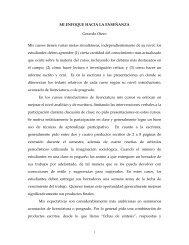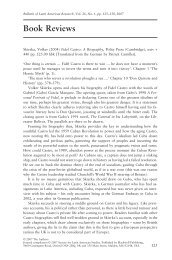Lexicon-Based Methods for Sentiment Analysis - Simon Fraser ...
Lexicon-Based Methods for Sentiment Analysis - Simon Fraser ...
Lexicon-Based Methods for Sentiment Analysis - Simon Fraser ...
You also want an ePaper? Increase the reach of your titles
YUMPU automatically turns print PDFs into web optimized ePapers that Google loves.
Computational Linguistics Volume 37, Number 2<br />
in the dictionaries. The per<strong>for</strong>mance is constant across review domains, however, and<br />
remains very good in completely new domains, which shows that there was no overfitting<br />
of the original set.<br />
Table 4 shows a comparison using the current version of SO-CAL with various<br />
dictionary alternatives. These results were obtained by comparing the output of SO-<br />
CAL to the “recommended” or “not recommended” field of the reviews. An output<br />
above zero is considered positive (recommended), and negative if below zero.<br />
The Simple dictionary is a version of our main dictionary that has been simplified to<br />
2/−2 values, switch negation, and 1/−1 intensification, following Polanyi and Zaenen<br />
(2006). Only-Adj excludes dictionaries other than our main adjective dictionary, and<br />
the One-Word dictionary uses all the dictionaries, but disregards multi-word expressions.<br />
Asterisks indicate a statistically-significant difference using chi-square tests, with<br />
respect to the full version of SO-CAL, with all features enabled and at default settings.<br />
These results indicate a clear benefit to creating hand-ranked, fine-grained,<br />
multiple-part-of-speech dictionaries <strong>for</strong> lexicon-based sentiment analysis; the full dictionary<br />
outper<strong>for</strong>ms all but the One-Word dictionary to a significant degree (p < 0.05) in<br />
the corpora as a whole. It is important to note that some of the parameters and features<br />
that we have described so far (the fixed number <strong>for</strong> negative shifting, percentages <strong>for</strong><br />
intensifiers, negative weighting, etc.) were fine-tuned in the process of creating the<br />
software, mostly by developing and testing on Epinions 1. Once we were theoretically<br />
and experimentally satisfied that the features were reasonable, we tested the final set of<br />
parameters on the other corpora.<br />
Table 5 shows the per<strong>for</strong>mance of SO-CAL with a number of different options, on<br />
all corpora (recall that all but Epinions 1 are completely unseen data). “Neg w” and<br />
“rep w” refer to the use of negative weighting (the SO of negative terms is increased<br />
by 50%) and repetition weighting (the nth appearance of a word in the text has 1/n of<br />
its full SO value). Space considerations preclude a full discussion of the contribution of<br />
each part of speech and sub-feature, but see Brooke (2009) <strong>for</strong> a full range of tests using<br />
these data. Here the asterisks indicate a statistically-significant difference compared to<br />
the preceding set of options.<br />
As we can see in the table, the separate features contribute to per<strong>for</strong>mance. Negation<br />
and intensification together increase per<strong>for</strong>mance significantly. One of the most<br />
important gains comes from negative weighting, with repetition weighting also contributing<br />
in some, but not all, of the corpora. Although the difference is small, we<br />
see here that shifted polarity negation does, on average, per<strong>for</strong>m better than switched<br />
polarity negation. We have not presented all the combinations of features, but we know<br />
from other experiments, that, <strong>for</strong> instance, basic negation is more important than basic<br />
Table 4<br />
Comparison of per<strong>for</strong>mance using different dictionaries.<br />
Dictionary Percent correct by corpus<br />
Epinions 1 Epinions 2 Movie Camera Overall<br />
Simple 76.75 76.50 69.79* 78.71 75.11*<br />
Only-Adj 72.25* 74.50 76.63 71.98* 73.93*<br />
One-Word 80.75 80.00 75.68 79.54 78.23<br />
Full 80.25 80.00 76.37 80.16 78.74<br />
*Statistically significant using the chi-square test, p < 0.05.<br />
282


